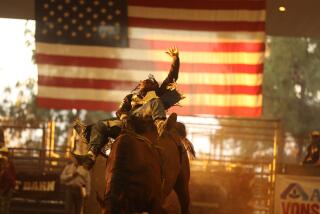The Beggar and the Cowboy
- Share via
Lately I’ve been thinking about a man called Fish. A panhandler, he introduced himself on a Santa Barbara sidewalk four years ago. He rattled a paper cup, flashed a toothless smile and announced he needed money “‘for swimming lessons.” His intention, Fish said with a wink, was to swim to Hawaii, where he no long would bother the good people of Santa Barbara.
At the time, the town was in the midst of a crackdown on panhandlers. I filled Fish’s paper cup, and he filled my notebook with a story. His real name was Jim Brown and he’d been on the streets for 12 years. Before that, he said, he’d led a solid life, with a family, a fishing boat, a house. He lost it all, Fish said, in divorce court.
Still, he was hopeful. An appellate court, he said, had ruled in his favor. Any day now, a “big piece of change” was going to come his way. He’d buy another fishing boat, and maybe a house. That was Fish’s story, and he said anybody at Joe’s Cafe could verify it. Well, it all sounded pretty far-fetched, a fairy tale told by a lost soul engaged in the hard work of cadging quarters from strangers.
Months later I received a letter. It was from a parking lot caretaker in Santa Barbara. He had come to know Fish, whom he described as a “scuffed-up Rembrandt stuck in a thrift-store bin.” He told how Fish slept in a Dumpster near his parking lot, how “on his good days” the panhandler could engage in bright conversation. Fish, the letter writer continued, had disappeared not long after my column on him was published. The next time he saw Fish, he was startled.
Fish was changed, “a man with a destination. Said he was going up and down the coast looking for a boat. The settlement was at hand.” A few weeks later, Fish was back again, “a restored Rembrandt. New shoes. A car. Still no front teeth, but, hey, first things first. Gave me an invite to come south and visit. Bring the old lady. Get a look at the boat.
“I’m in no hurry,” the correspondent noted in closing, “to verify this.”
Neither was I. After a few half-hearted attempts to find the restored Jim Brown, I decided to accept the happy ending on faith. I prefer to imagine Fish in his boat, nets stuffed with fish, halfway to Hawaii.
*
I’ve also been thinking about the Marlboro Man. By that I do not mean the mythic cowboy character of Philip Morris fame. I mean a specific cowboy named Daryl Winfield. For a long time, he was one of the most prolific models employed in the Marlboro campaign, a 50ish man with sky blue eyes set in a lean, weathered face. His trademark was a red cowboy shirt.
Winfield and my father were friends. In the 1950s they helped build a big feedlot near Kerman, in the San Joaquin Valley. Twenty years later, working summers at the same feedlot, I would be told and told again the story of Winfield’s big break. It was a story of hope, a lottery story, of sorts, repeated reverently by $5-an-hour millworkers over lunch in a fly-infested sweatbox of a cafeteria. It went like this:
He was working cattle one day up in Wyoming when he stumbled upon an advertising crew. The photographers wanted a shot of a Marlboro cowboy jumping a horse across a river. They had a problem. Their cowboy was too drunk to ride. Someone spotted Winfield among the bemused onlookers.
“For fifty dollars,” he was asked, “would you jump your horse over that river.”
“For fifty dollars,” the $500-a-month cowboy shot back, “I’d jump this horse over the moon.”
And he never needed to slop through the feedlot pens again.
Or so went the story.
Years later, working for the San Francisco Examiner, I caught up with Winfield at his Wyoming ranch. It was a nice place, but nothing like the vast, gilded spread described by the lunch-hour storytellers. I repeated the story. Was that how it happened? I asked.
“Well,” he said, blue eyes twinkling, “it was something like that.”
Today, almost 20 years later, what I remember most about our conversation was Winfield’s outlook on smoking. He had made a sort of deal. He figured he’d rather smoke and enjoy himself, even if it took five years off his life. Back then, the perils of second-hand smoke were not part of the equation. Back then, the cigarette companies were not on the run. Now, of course, it’s all changed.
In the tobacco uproar, the domestic Marlboro Man campaign has been canceled, and the anti-smokers have produced a parody billboard. It shows two cowboys on horseback, somewhere in Marlboro country. “Bob,” one is saying to the other, “I have emphysema.”
Whenever I see that billboard, it makes me wonder about my dad’s old cowboy friend. I wonder how he feels today about that five-year trade-off. I wonder about his health. Maybe one of these days I’ll try to look him up. And maybe I won’t. As with Fish, it could be one of those stories best left unexplored.
More to Read
Sign up for Essential California
The most important California stories and recommendations in your inbox every morning.
You may occasionally receive promotional content from the Los Angeles Times.











